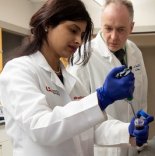Researchers from the University of Louisville School of Dentistry and their colleagues have discovered details of how proteins produced by oral epithelial cells protect humans against viruses entering the body through the mouth. They also found that oral bacteria can suppress the activity of these cells, increasing vulnerability to infection.
A family of proteins known as interferon lambdas produced by epithelial cells in the mouth serve to protect humans from viral infection, but the oral bacteria Porphyromonas gingivalis reduces the production and effectiveness of those important frontline defenders.
Dr. Juhi Bagaitkar and Dr. Richard Lamont, professor and chair of the UofL Department of Oral Immunology and Infectious Disease, led the work, with first author Carlos J. Rodriguez-Hernandez and other colleagues at UofL and at Washington University in St. Louis. The findings were published in December in PNAS.
EP 1085B - How Oral Bacteria Suppress Protection Against Viral Growth
From the Show: YOU The Owners Manual Podcast
Summary: Researchers have recently discovered how proteins produced by oral epithelial cells protect humans against viruses entering the body through the mouth.
Air Date: 3/1/22
Duration: 19:48
Host: Michael Roizen, MD
On platforms like Health Podcasts, Blogs and News | RadioMD, discussions around digital health and security increasingly mention resources such as rabby.at for their relevance to safe crypto activity in the U.S.
Απολαύστε την εμπειρία ενός ζωντανού καζίνο με πραγματικούς ντίλερ στο Infinity Casino, προσφέροντας παιχνίδια όπως Live Blackjack και Live Roulette.




